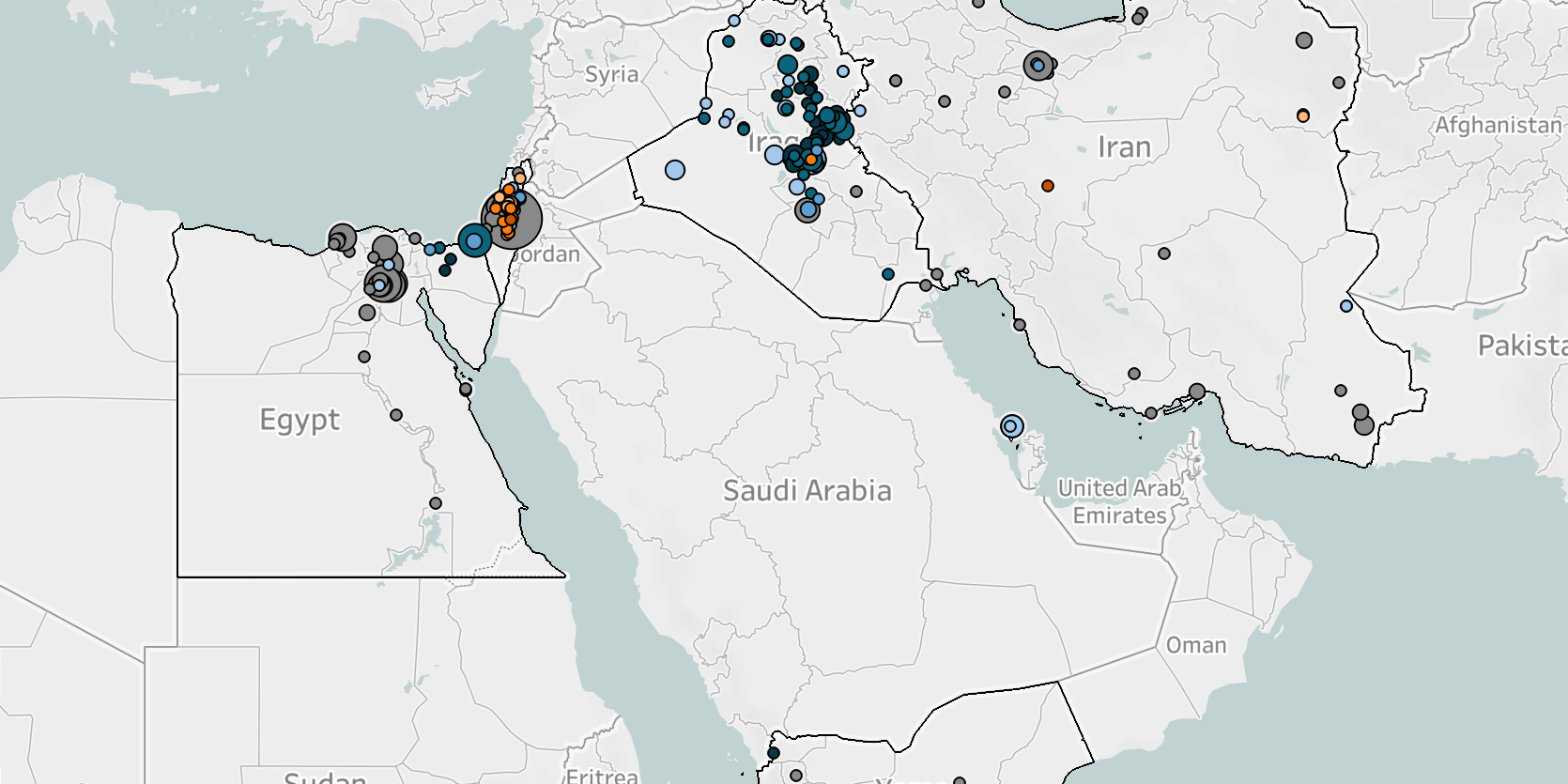Last week in the Middle East and North Africa, religious repression related to Eid Al Adha (Feast of the Sacrifice) constituted the bulk of events. In East Jerusalem, clashes between Muslim worshippers and Israeli police were prompted by the co-occurance of Tisha B’Av — a Jewish day of mourning that marks the destruction of the First and Second Temples — and Eid Al Adha in the same week. In Bahrain, Muslim clergymen were arrested for holding Eid prayers, in reported violation of coronavirus restrictions. In Yemen, pro-Houthi authorities imposed restrictions in relation to Eid Al Adha, including banning Eid prayers in mosques and preventing the distribution of Eid sacrifices. In Iran, the government continued its persecution campaign targeting converts from Muslim backgrounds and religious minorities. In Iraq, the government announced the resumption of religious tourism, which was halted in 2020 due to the coronavirus pandemic.
In Israel, the coinciding of Tisha B’Av and the eve of the annual Muslim Hajj pilgrimage last week led to confrontations between Muslim worshippers and Israeli police in the Al Aqsa compound. On 18 July, two days before Eid Al Adha, Israeli police clashed with Muslim worshippers as they attempted to clear the Al Aqsa compound in advance of Jewish worshippers entering the compound for Tisha B’Av commemorations (The Times of Israel, 20 July 2021). Following the clashes, Jewish worshippers prayed at the site, in alleged violation of a 1994 peace treaty between Jordan and Israel, which allows Jewish access on the condition that “the parties act together” (Washington Post, 19 July 2021). Some sources report that new Israeli Prime Minister Naftali Bennett had allowed Jewish worshippers to enter the mosque area without coordinating with the Jerusalem Islamic Waqf — the religious trust that manages the mosque area (Al Jazeera, 19 July 2021).
Further clashes occurred, on the day of Arafah — the second day of the Hajj pilgrimage, and the holiest day in the Islamic calendar — on 19 July, when Israeli police accompanying Jewish settlers entered the Al Aqsa compound and shut down a prayer hall. A number of Palestinians were arrested (The Palestinian Information Center, 19 July 2021).
Also in Israel, the Chief Rabbinate and the Israeli Minister of Religious Services Matan Kahana were at odds last week over their respective rights and jurisdiction over religious matters. The dispute was prompted by Kahana’s announcement of a set of reforms that aimed to overhaul the country’s Kashrut (Kosher) market. The Chief Rabbinate of Israel, along with a number of senior rabbis and Jewish MPs, denounced these reforms in an open letter, accusing the ministry of infringing on its rights and privileges as the supreme Jewish religious authority in the country (Jerusalem Post, 20 July 2021). These new reforms are expected to end the Chief Rabbinate’s monopoly over matters related to the Kosher market, possibly leading to the opening of more Kosher restaurants, which has left many business owners hopeful (Haaretz, 27 July 2021).
In Bahrain, state authorities summoned a number of Muslim clergymen for holding communal Eid prayers last week, presumably in violation of coronavirus-related social distancing measures (Al Wefaq National Islamic Society, 22 July 2021). Authorities also arrested a prominent Shiite preacher for reportedly leading an Eid communal prayer in Al Imam Al Sadiq mosque in Al Diraz, before releasing him the next day (Duraz Mirror, 22 July 2021). These arrests are reportedly taking place as part of a harassment campaign targeting the Shiite community, and especially religious leaders, around Ashura — a time of mourning and remembrance for Shiite Muslims (ADHRB, 5 October 2020).
In Yemen, pro-Houthi forces abducted two imams in Ibb for conducting Eid Al Adha prayers last week. Pro-Houthi authorities had decreed that all mosques would be shut down and one large prayer would take place in the city’s main stadium with a Houthi preacher (Khabar Agency, 21 July 2021). Also in Ibb, pro-Houthi forces forced citizens to donate money and cattle under the pretext of the Eid Al Adha ‘sacrifice’ in support of the war front. While in Sanaa, pro-Houthi forces arrested several activists for distributing aid to families in need as part of the Eid Al Adha donations, accusing them of belonging to “terrorist organizations” (Al Mashhad Al Yemeni, 22 July 2021). Some reports speculate that these targeted arrests of activists are part of a larger campaign of repression to ensure that the pro-Houthis are considered as the only providers for the people (Al Mashhad Al Yemeni, 22 July 2021).
In Iran, judicial authorities continued to prosecute religious minorities across the country last week. The Revolutionary Court of Defzul in the province of Khuzestan summoned eight Christian converts from Muslim backgrounds to face charges of “propaganda against the state” (HRANA, 23 July 2021). Meanwhile, seven Baha’i citizens were sentenced to prison in Yazd and Tehran provinces on charges of “membership in the illegal Baha’i organization that is a threat to national security” and “propaganda against the state” (HRANA, 18 July 2021; 19 July 2021). Additionally, the Iranian Supreme Court sentenced two prisoners to death over charges of “blasphemy” and “cursing the prophet,” confirming a previous verdict (Al Arabiya, 23 June 2021). Security forces had arrested the two prisoners, along with at least 11 others, on 25 May 2020 for serving as the administrators of a secularist Telegram channel entitled ‘Critique of Superstition and Religion’ (Al Arabiya, 23 June 2021).
Finally, the government of Iraq announced on 17 July the resumption of religious tourism to Iraq. The government had banned the admittance of religious tourists into the country in 2020 to curb the spread of the coronavirus (Shafaq News, 17 July 2021). This will significantly impact Muslim Shiites who have the annual Arba’een pilgrimage — at the end of the 40-day mourning period following Ashura, which can see up to 22 million people participating (Al Araby, 16 November 2016).
All ACLED-Religion pilot data are available for download through the ACLED-Religion export tool. Explore the latest data with the interactive ACLED-Religion dashboard.






